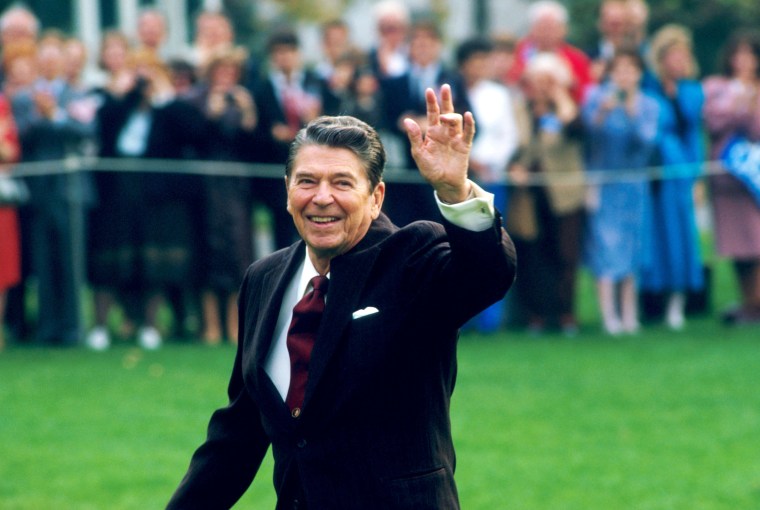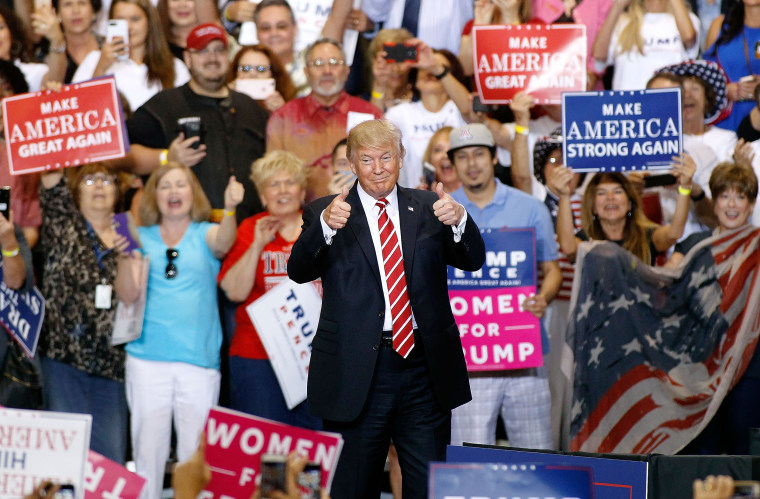A few days ago, I wrote about my nagging doubt when it comes to the meaning of Donald Trump’s poll numbers, which look terrible.
The problem: The polls were just as rotten during the campaign, and he still won. What does it mean, I wondered, that so many people who held him in such low regard sided with him anyway?
One possibility is a backlash against the media and popular culture that has redounded to Trump’s benefit. This is a tricky area to get into, and admittedly one that’s difficult to measure. But it has potentially significant implications for our understanding of his presidency and deserves a lot more discussion, especially in light of the blunt force tirade Trump directed at the press during his Phoenix rally earlier this week.
The idea rests on a few premises. The first seems self-evident: That Trump’s presidency is distinct from his predecessors when it comes to the central position he occupies in our culture.
In the past, presidents would dominate news cycles for periods of time, but also recede into the background for long stretches. They would make occasional ventures into the cultural realm — whether it was Ronald Reagan calling the Super Bowl winners in their locker room or Barack Obama kibitzing with David Letterman. But when they were in the headlines, it was largely because of the duties of the job: Pressuring Congress; delivering a policy speech; signing a law; meeting a foreign head of state and so on.
Now think about the Trump presidency. Has there been a day — or even an hour or a minute — when he’s faded out of the picture? Politics has traditionally been a niche pastime for Americans, but the appetite for coverage of Trump seems endless. Digital subscriptions for major national papers are surging. Cable news ratings have exploded to unheard-of levels. Political podcasts are proliferating.
More significantly, Trump has become the focal point of popular culture. Stephen Colbert has rebuilt his show around Trump’s presidency, and reaped a ratings windfall. His competitors aren’t much different. As I wrote the other day, late-night television can feel like an extension of cable news these days. Trump's ubiquity is apparent across the cultural landscape, from outspoken celebrities to previously apolitical publications.
Presidents have played prominent roles in American culture before. Obama’s footprint was sizable, and Reagan, of course, came to politics from Hollywood. But even they lacked Trump’s omnipresence.
The depiction of Trump through media and culture seems uniquely hostile. Yes, "the media" is an overly broad term; it includes, for instance, Fox News, where friendly treatment of the administration is commonplace.

But overall, the push back against Trump has been fierce. Coverage from major news outlets often has been withering, and it has also taken a new form, with some journalists policing breaches of the norms of presidential leadership. Critics, of course, say this is essential, and that it may not go far enough.
From popular culture, there’s similar aggression. Presidents have always been the butt of late-night comics, but with Trump there is a very different edge. Again, there’s an argument Trump brings this on himself, that it’s a fitting response to the crudeness he has consistently exhibited.
The point here isn’t to litigate responsibility for this dynamic or whether it's appropriate; it’s to establish that it exists. In a way we’ve never seen before, this president and popular culture are locked in constant combat, and it’s playing out on every imaginable media platform.
It raises a question: Do we really know what something like this does to public opinion? Obviously, a critical or even confrontational posture toward Trump resonates with millions of Americans. But is there another side to it?
It seems relevant here that media and culture tend to reflect more liberal values and sensibilities. This has been true for a long time, but it’s also an accelerating trend. As smaller regional newspapers vanish, jobs in journalism are increasingly concentrated in a handful of coastal cities, where conservative Republicans are rare. Social media looms large as well, reinforcing prevailing beliefs and assumptions.
This is why a tweetstorm last week from Hugh Hewitt, the conservative radio personality (and MSNBC host), grabbed my attention. He wrote of conversations with Republicans who are critical of and frustrated with Trump. Perhaps if reached by a pollster, they’d say they disapprove of his job performance, or have a negative view of him personally — thereby contributing to the perception that Trump’s own base is abandoning him.
But, Hewitt said, these Republicans are ultimately more enraged by the conduct of the "elite media." Trump, he concluded, "has all the right enemies."
Was this a factor in the willingness of so many people who didn’t like him to vote for Trump anyway?
Popular culture was pushing hard against Trump in the campaign, too. I recall a skit on Colbert’s show the night before the election. Jon Stewart made a surprise appearance. The two men talked with a girl who was supposed to be a stand-in for every voter who couldn’t decide between Clinton and Trump. "I can’t tell which is worse," she said.
"He’s worse!" Colbert and Stewart replied.
Now I find myself imaging the kind of voter Hewitt described watching that skit. Would that person have seen in it a kernel of humorous wisdom — or a heavy-handed reminder of popular culture’s liberalism?
I don’t know if there was a backlash against popular culture that boosted Trump on November 8. If there was, I also don’t know if it’s still operative now. But it does seem possible that a powerful force that has dedicated itself to fighting Trump could be having a different effect than we assume.

